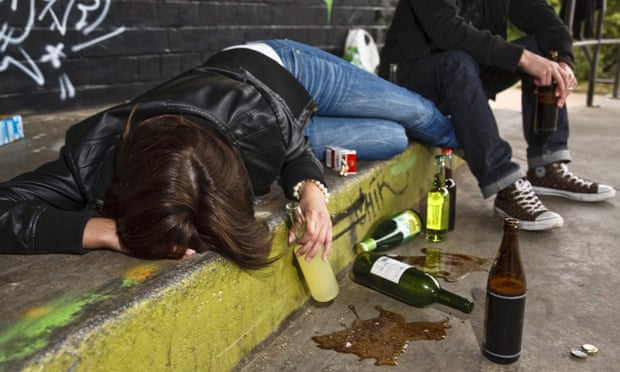Drunk tourists staggering down Spanish streets at night might need to pay more attention this summer. In a crackdown on dangerous walking, Spains Directorate General of Traffic plans to introduce breathalyser tests for pedestrians . They also suggest introducing an off-road speed limit for joggers. The proposals, buried among other road safety suggestions, would give pedestrians responsibilities akin to drivers and ought to inspire other new laws in their footsteps.
Might we see other similar laws follow on their heels? Shortsighted people could be charged for leaving the house without their glasses, for instance. Walking and texting (and the associated crime of moving like a robot , as one Australian study described the result) might see you fined. You could get a ticket for wearing any clothing that is eye-catching enough to distract drivers something Rome already gamely tried to introduce in its aborted 2008 miniskirt ban .
To ensure a properly monitored quality of walking, meanwhile, pedestrians could be required to undergo a full MOT, with anyone whose physical equipment isnt in suitable condition banned from leaving the house until essential repairs are made. Taking their cue from motorways, the pavements of major streets could be barred to parents pushing buggies, because theyre just too slow.
A closer look at the small print of Spains plan (itself heavily criticised by other sectors of Spains government) reveals that it isnt going that far just yet. It cant do, because theres still no official level of alcohol intake in Spain after which youre banned from using your legs. What the plan does suggest is that when pedestrians are charged with an already existing legal infraction such as jaywalking or involved in a car accident, then they could be given a drug or alcohol test. Again, its not entirely clear what the authorities would do with this information: a high reading for either test could lead to a reckless jaywalker getting a stiffer sentence, perhaps.
Looked at this way, the plan comes across as a little more, well, sober. If pedestrians (and cyclists, for that matter) are capable of causing harm through neglect, then perhaps they should indeed be held to the same standards as motorists not least for their own preservation.
It might seem obvious that drunk pedestrians get up to more risky behaviour that sober ones, but some experts in the field have gone to the trouble of backing up that assumption empirically. A 2011 study published in the evocatively named Journal of Trauma found that 55% of pedestrians who had consumed alcohol ignored designated crosswalks, compared to 22% of sober ones. When things went wrong, the drinkers also did themselves (and possibly others) far more damage: on average, they stayed two days longer in hospital than sober accident victims, with injuries that were typically almost twice as severe. If theres a legal nudge that could curb reckless behaviour, it might not be such a bad thing
But its still quite a leap from what is effectively a hunch that legal curbs on drunks crossing the street could actually improve road safety to the specific change that Spains Directorate of Traffic is proposing. If the plan goes ahead, pedestrians would be reclassified, just like drivers, as users of the road.
This suggests an equality of responsibility between pedestrian and drivers that just doesnt bear up. At the risk of stating the obvious, pedestrians are not as closely controlled as drivers because they are not, for the most part, encased within a motor-propelled steel-and-glass bone-cruncher. Classifying pedestrians as road users is also disingenuous, unless being obliged to face an unavoidable gauntlet of cars whenever you need to cross the street is going to be deemed as use. If pedestrians really were users of the road on the same footing as motor vehicles, our roads would soon be not grey but red.
In fact, Spains plans can be read as part of a long history of attempting to shift responsibility away from drivers on to those they hit. As this article by Sarah Goodyear points out, prior to the mid 1920s it was taken pretty much as a given that vehicles should always take responsibility for road accidents. It was only intense lobbying by the car industry that saw jaywalking classified as a US offence. This lobbying was in itself a fight-back against public campaigns to cut accidents by fitting cars with compulsory speed limiters. The drive to normalise and shift blame for the high road death and injury toll on to the un-armoured pedestrian was thus a turf war, one powered as much by the bottom lines of car companies as by safety concerns.
Trying to overturn this bias towards victim-blaming is an ongoing and arduous task. Proposed laws like Spains that attempt to spread responsibility away from cars would only make things worse, by releasing the pressure to create, say, lower urban speed limits and better signage. Though if they find a way to imprison people who text while strolling, they might not be such a bad thing entirely.
http://www.theguardian.com/cities/2015/feb/25/spain-wants-to-ban-drunk-walking-what-next-for-pedestrians









To ensure a properly monitored quality of walking, meanwhile, pedestrians could be required to undergo a full MOT, with anyone whose physical equipment isnt in suitable condition banned from leaving the house until essential repairs are made. Taking their cue from motorways, the pavements of major streets could be barred to parents pushing buggies, because theyre just too slow.
hmmm.....good question......
Don't we do this by charging people with public intoxication?
This seems a bit extreme, but may not be, in practice. I mean, you can't ban baby buggies...
lol....LOVE DINO!!!
I miss him... He was so great!
I have read that in real life Dino rarely drank alcohol.....
He was funny and had a great vice...IMO
Well, well, well! If wine weren't cheaper than water in Spain, there wouldn't be an issue, would there?
lol Good point Neetu!
Had to watch the Dean Martin Roast - all 1.42 of it - absolutely awesome.









lol Funny stuff!!
I'm OK with drunk walking . It's the drunk vomiting I don't care for ...
Good point...I don't like ANTBODY vomiting....I would be joining them....EEWWW